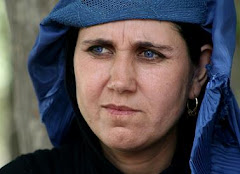 KABUL, Afghanistan—At least 18 people, including six coalition-force members, were killed and almost 50 were wounded when a suicide car bomber targeted a U.S. military convoy outside an Afghan military-recruitment center in Kabul Tuesday morning, police officials said.
KABUL, Afghanistan—At least 18 people, including six coalition-force members, were killed and almost 50 were wounded when a suicide car bomber targeted a U.S. military convoy outside an Afghan military-recruitment center in Kabul Tuesday morning, police officials said.A spokesman from the North Atlantic Treaty Organization said six "international service members were killed and several wounded" in the attack. 21 Afghan civilians were killed too.
Gen. Khalil Dastyar, the deputy police chief of Kabul, said the dead NATO members were American as one of the six was a Canadian colonel, the highest-ranking Canadian killed since the country's Afghan mission began in 2002.
A Taliban spokesman, Zabihullah Mujahid, claimed responsibility for Tuesday's attack, saying that a car loaded with 550 kilograms of explosives rammed into a U.S. convoy at about 8: 30 a.m. local time. The blast destroyed at least 12 civilian vehicles, one of them a bus. NATO said five of its vehicles were damaged.
30 a.m. local time. The blast destroyed at least 12 civilian vehicles, one of them a bus. NATO said five of its vehicles were damaged.
The bomber targeted a small convoy of U.S. military vehicles moving along the road near the recruitment center, officials said. The road also skirts a U.S. military base, Camp Julien, that hosts a counterinsurgency training academy for Afghan and U.S. military personnel.
"Today's attack was part of the Al Fatah operation, and we will continue attacking foreigners and government security forces and their associates," Mr. Mujahid said.
Earlier this month, the Taliban announced the launch of a spring offensive called Al Fatah, Arabic for "to conquer" or "victory." The Taliban said the offensive would besiege Afghanistan's major cities, and target the diplomats and infrastructure of both the Afghan government and NATO.
Gen. Khalil Dastyar, the deputy police chief of Kabul, said the dead NATO members were American as one of the six was a Canadian colonel, the highest-ranking Canadian killed since the country's Afghan mission began in 2002.
A Taliban spokesman, Zabihullah Mujahid, claimed responsibility for Tuesday's attack, saying that a car loaded with 550 kilograms of explosives rammed into a U.S. convoy at about 8:
 30 a.m. local time. The blast destroyed at least 12 civilian vehicles, one of them a bus. NATO said five of its vehicles were damaged.
30 a.m. local time. The blast destroyed at least 12 civilian vehicles, one of them a bus. NATO said five of its vehicles were damaged.The bomber targeted a small convoy of U.S. military vehicles moving along the road near the recruitment center, officials said. The road also skirts a U.S. military base, Camp Julien, that hosts a counterinsurgency training academy for Afghan and U.S. military personnel.
"Today's attack was part of the Al Fatah operation, and we will continue attacking foreigners and government security forces and their associates," Mr. Mujahid said.
Earlier this month, the Taliban announced the launch of a spring offensive called Al Fatah, Arabic for "to conquer" or "victory." The Taliban said the offensive would besiege Afghanistan's major cities, and target the diplomats and infrastructure of both the Afghan government and NATO.

The Taliban's ability to strike in the capital underscores the insurgents' potency as coalition forces seek to oust them from the southern city of Marjah and are gearing up for a campaign to secure Kandahar, the Taliban's heartland.
The death toll from the attack could rise, according to an official. Afghan interior ministry spokesman Zemarai Bashary said the "death toll is unclear" because officials are still checking hospitals. He said it had been weeks since the last attack in the capital.
The death toll from the attack could rise, according to an official. Afghan interior ministry spokesman Zemarai Bashary said the "death toll is unclear" because officials are still checking hospitals. He said it had been weeks since the last attack in the capital.

.jpg)



